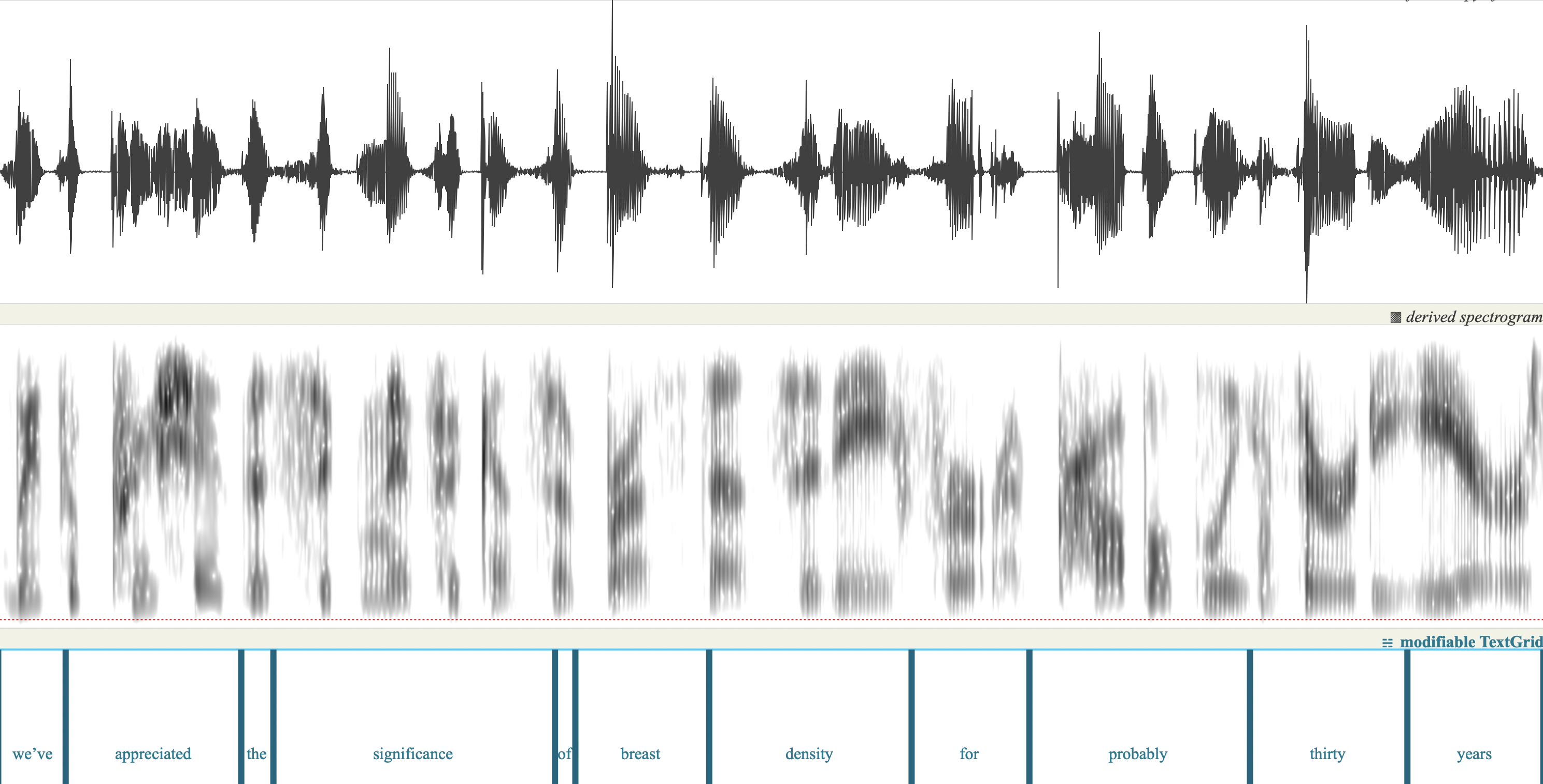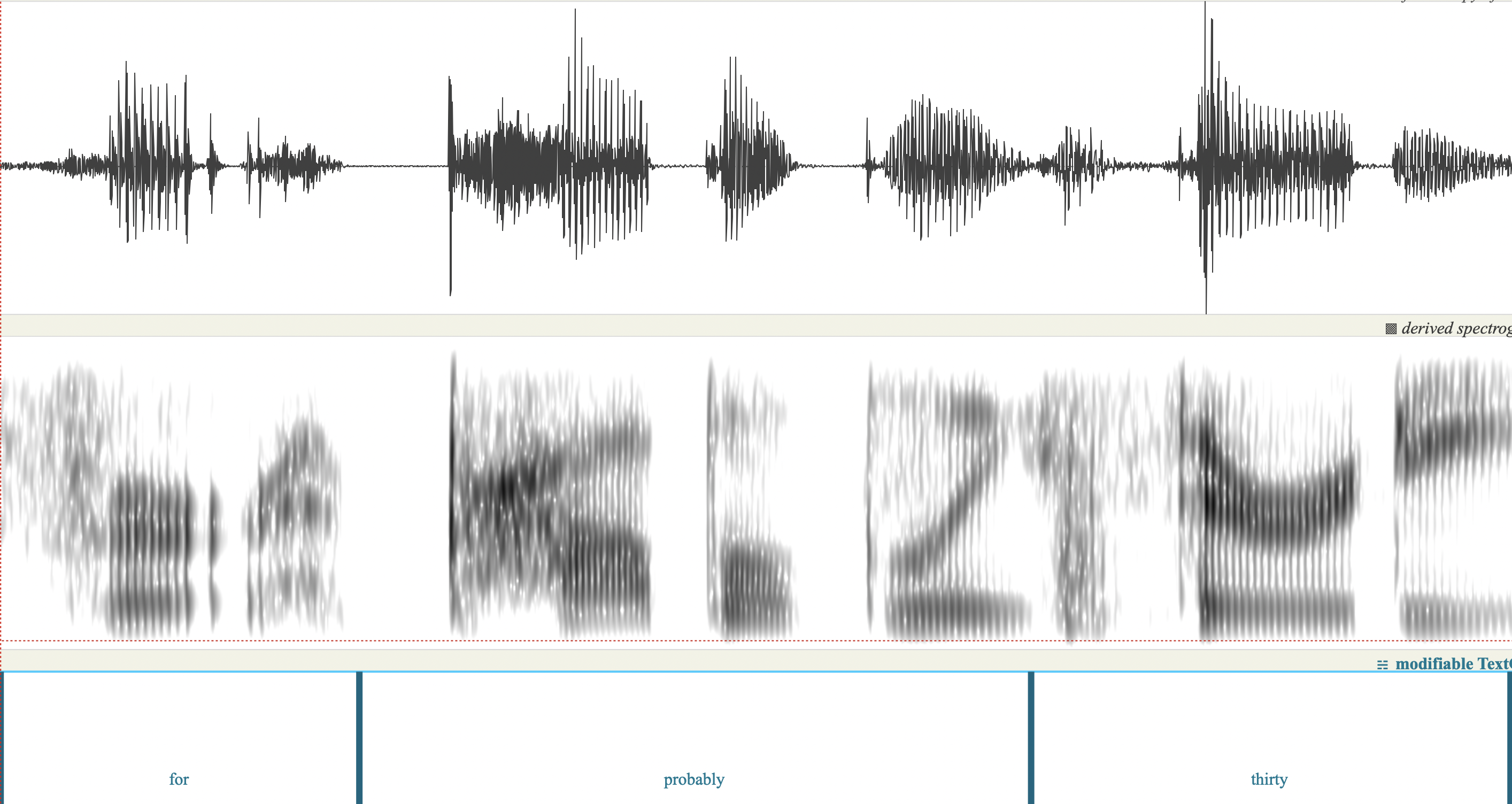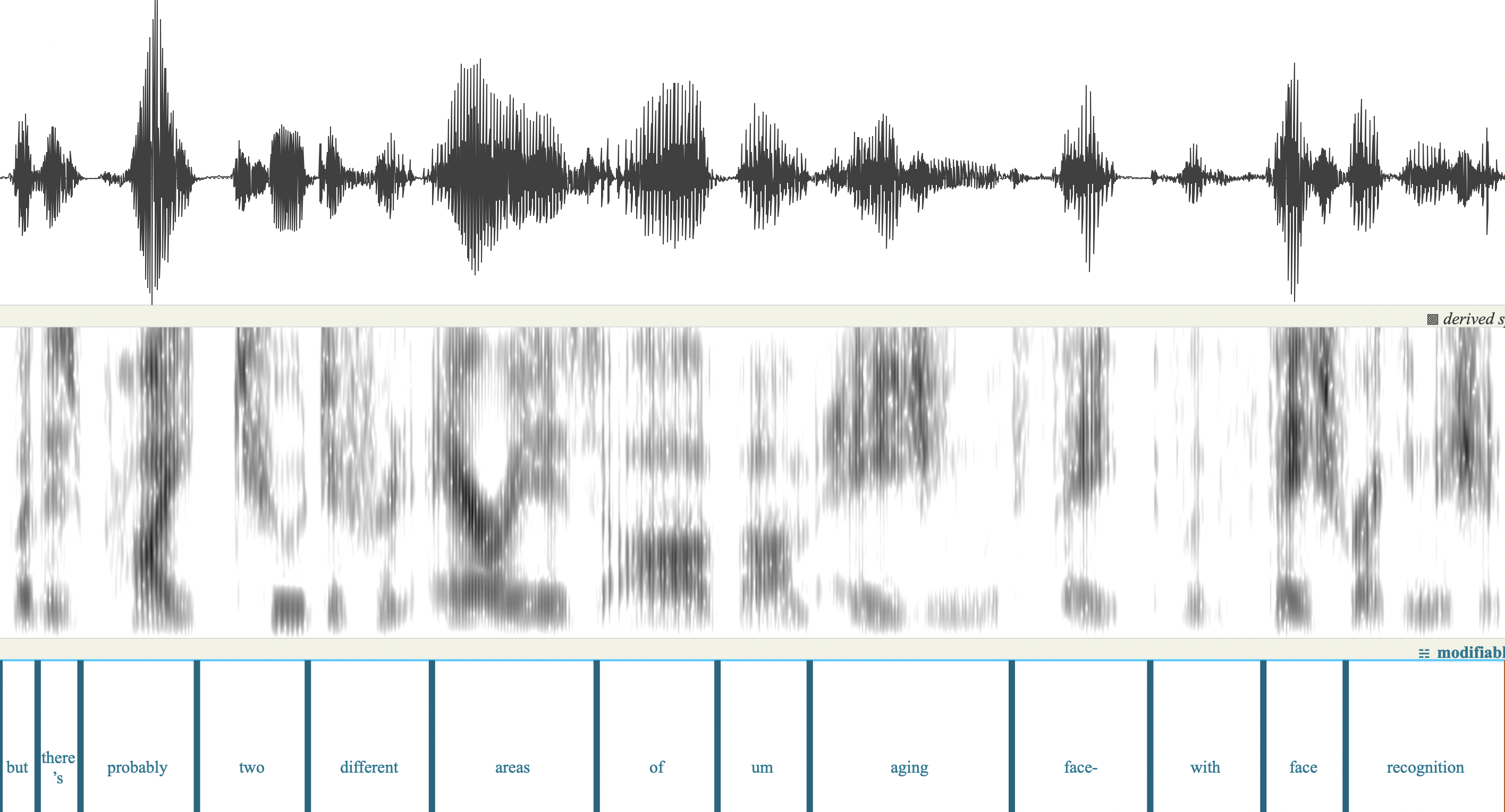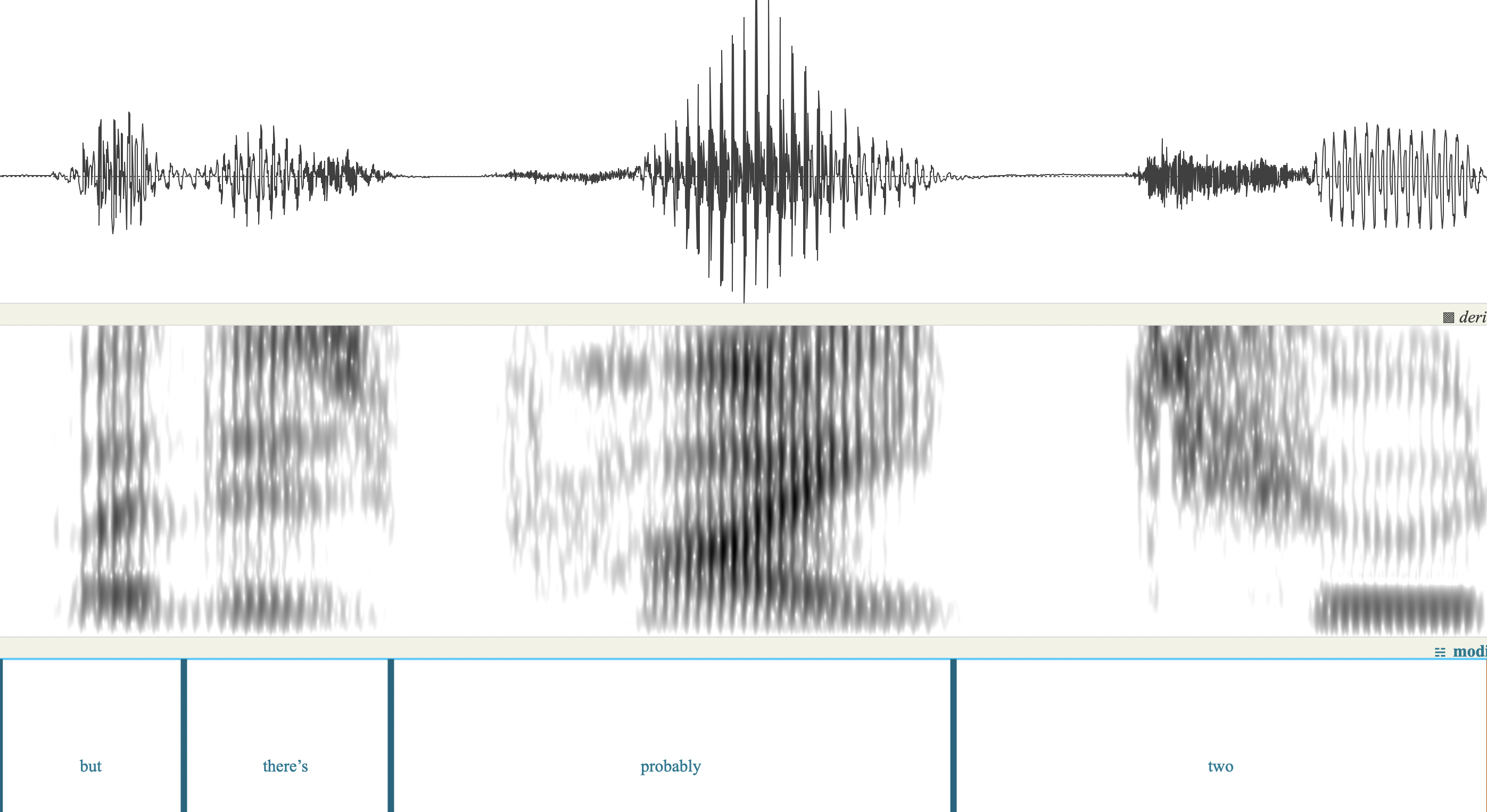Probably
« previous post | next post »
From Technology Connections on Bluesky:
My favorite weird language thing is the near universal shortening of "probably" to "pry" in speech.
And people don't notice they're doing it! If I write "yeah that's pry not gonna work" that doesn't parse right, but if you say it out loud it absolutely does.
— Technology Connections (@techconnectify.bsky.social) Aug 10, 2024 at 2:52 PM
As a first pass at checking this, I took 100 instances at random from the 39,731 occurrences of "probably" in the NPR podcast corpus that I've referenced before (3,199,859 transcribed turns from 105,817 NPR podcasts, comprising more than 10,648 hours).
What did I find?
The (dictionary pronunciation of the) word "probably" /ˈpɹɒbəbli/ has two intervocalic onsets, /b/ and /bl/, that are not followed by tautosyllabic stresssed vowels. They are therefore are candidates for the general process of intervocalic non-pre-stress lenition that's typical of American English, the best-known version of which is the flapping and voicing of coronal stops.
This articulatory and acoustic weakening happens to various degrees in the /b/ and /bl/ of "probably", including to the point of apparent deletion.
Let's start with an example that happens to have no lenition, from "Online Calculator Estimates Breast Cancer Risk", Morning Edition 4/19/2007:
Professor KARLA KERLIKOWSKE (Medicine, University of California San Francisco): When you do these models, you want something that's relatively simple and easy to measure.
AUBREY: And lifestyle isn't. No one can remember precisely what they eat or drink. But there are ways Kerlikowske would like to revive the Gail model. She would toss out the question asking women how old they were when their first baby was born. Not because other factors such as breast-feeding confound it, but because research suggests it is not as important as breast density.
Prof. KERLIKOWSKE: We've appreciated the significance of breast density for probably 30 years.
AUBREY: The trouble is, there's never been an automated way to measure in a mammogram, the volume of epithelial cells and surrounding tissue that are typically involved in breast cancer.
Prof. KERLIKOWSKE: We think if we had a quantitative measure of breast density that might add to the specificity of the model and really improve prediction for the individual woman.
Here's the full phrase containing un-lenited "probably":
And here we zero in on the word "probably" itself:
As you can see, each of the two /b/ performances has a well-defined silent stop gap, followed by a clear release burst.
At the other end of the lenition continuum, here's an example where both onsets are lenited unto apparent deletion, from "Machines Slowly Mastering Art of Recognizing Faces", Talk of the Nation 1/22/2022:
CATHY (Caller): Well, hi, Ira. I love your show and you have a very interesting subject today as usual. My question for your guests is about the ability of the facial recognition technology to recognize faces as they change over the years, say a photo of an infant versus a teenager, adult or a senior.
FLATOW: Hmm. Jonathan, any comment on that?
Dr. PHILLIPS: So theres probably – there again, this is a very active research. But there's probably two different areas of aging with face recognition. The first, for example, is going from an infant as somebody grows through adulthood, because there are fixed ways of changing and there is substantial change. The other is for an adult from the age, say, from age 20 as they grow older in life.
And face recognition seems to be relatively stable up to about five years. But the challenge is then how do you model or account for people change from, say, 20 – from 10 to 20 years or beyond?
The full "probably" phrase:
And zeroing in on the pronunciation of "probably", which shows the type of reduction described in the Bluesky link:
The speaker there is Jonathon Phillips, electrical engineer, program manager, Multiple Biometric Grand Challenge, National Institute of Standards and Technology, Washington, DC. This is not a speech error — he's an articulate native speaker of American English, speaking in a fairly formal style, though rapidly.
In my modest 100-phrase "probably" sample, there were many other lenition patterns. Sometimes one or both of the /b/s lost their stop closure and turned into the kind of voiced approximant that phoneticians sometimes call "frictionless fricatives". Sometimes one of them was lenited unto apparently deletion while the other one remained stop-like, with results the might be spelled "probly" or "probby". This sample did not validate the claim that the full lenition-to-one-phonetic-syllable is "near universal", and the result is not the generally the same as the pronunciation of the word "pry", though the patterns probably overlap. But "pry"-like pronunciations of "probably" certainly happen.
I don't have time this morning to survey the full range of "probably" variants and to estimate their relative frequency in the NPR sample — or to look at samples from less formal sources. Those are tasks for another time, maybe — though because the variant performances of "probably" reflect gradient articulatory and acoustic changes, it's not easy to assign them to qualitatively distinct categories, or even decide exactly what to measure. If I were forced to define a set of "probably"-pronunciation categories, there would need to be a dozen or so of them. A qualitative and quantitative analysis of these patterns of variation, and the factors that correlate with them, would be a good phonetics-course term project!
See also "More probably"…
A few earlier posts on the general issue of phonetic lenition in English:
"Weak t", 4/17/2017
"On beyond the (International Phonetic) Alphabet", 4/19/2018
"Farther on beyond the IPA", 1/18/2020
"First novels", 3/13/2022
"Pronunciation evolution", 4/15/2022
"More post-IPA astronauts", 4/16/2022
"Political flapping and voicing", 5/29/2022
"Ron's Princibles", 8/22/2023
"'There's no T in Scranton'", 3/10/2024
"Annals of intervocalic coronal reduction", 7/26/2024




WINIFER KINGSLEY SKATTEBOL said,
August 11, 2024 @ 9:58 am
Not to mention "always" pronounced as awys and "didn't" pronounced as dint.
Michèle Sharik Pituley said,
August 11, 2024 @ 10:24 am
Fascinating!
I find myself saying either “prolly” or “prah-ee” (which is the same but without the Ls).
Tim Leonard said,
August 11, 2024 @ 10:52 am
If I'm tired or hurried, it's "yah thas prae na ga wuk".
Jay Sekora said,
August 11, 2024 @ 10:59 am
Echoing Michèle, in my idiolect, it’s either /ˈprɑ.li/ with an /l/ or /ˈprɑ.i/ with no /l/ but definitely two syllables (although one of them quite quick). Never /ˈprɑ.bli/, though, and only /ˈprɑ.bəˌbli/ if I’m speaking very carefully. To my ears Jonathon Phillips’ pronunciation is two syllables, like mine.
I think the reason it doesn’t reduce all the way to /ˈprɑj/ for me is that there’s some secondary stress on the /li/~/i/ syllable, and I retain a little bit of that; the /i/ isn't completely unstressed. So “probably gonna be me” would come out something like /ˈprɑˌi.gə̃mˌbiˈmi/, with roughly comparable stress on the two /i/ nuclei (excluding /ˈmi/) and significantly less on /ə̃/.
Annie Gottlieb said,
August 11, 2024 @ 11:10 am
Not a linguist so I don't know the terminology, but the mouth shapes required to say "pry" actually break down to "prah-ee," and those are the two main vowel sounds in "probably." Since it takes work to put your lips together—no less TWICE—this serves as an easily understood auditory shorthand. Nome sane?
J.M.G.N. said,
August 11, 2024 @ 11:18 am
Regarding [prai], what is the pronunciation spelling used to reflect this phenomenon though?
https://en.wiktionary.org/wiki/Talk:prolly#c-Soap-2021-09-15T19:08:00.000Z-pry
Philip Taylor said,
August 11, 2024 @ 12:16 pm
I'm not convinced that native speakers of British English would reduce "probably" to the extennt reported here, but when (without telling him why) I asked one of our Vietnamese front of house staff to read "Table four telephoned to say they would probably be 20 minutes late" out loud, his "probably" came out something close to /ˈprɒb·ri/ whilst my wife’s (also Vietnamese) came out as /ˈprɒ·bə·li/. I don't have access to any native speakers of British English at this moment.
Chris Button said,
August 11, 2024 @ 12:21 pm
Can't we just call it a [β̞]. I suppose there's no designated IPA symbol for the same reason something like [ʁ̞] doesn't have one either.
Philip Taylor said,
August 11, 2024 @ 1:38 pm
OK, three more informants: two native speakers of <Br.E>, one from Noorthern Ireland. Of the two native speakers, one gave "probably" its full (LPD) value, one rendered it as /ˈprɒ·bə·li/. The Northern Ireland speaker gave it its full LPD value.
Oracles said,
August 11, 2024 @ 1:52 pm
I recall a high school teacher many moons ago, whom we assigned the nickname "Pobby" after his pronunciation of "probably". We all found it rather unusual, so I'm not sure where it came from. This was central Michigan in the early '70s, he was a WWII vet who grew up in the area.
Xtifr said,
August 11, 2024 @ 3:37 pm
I think the most common eye dialect version I've seen written is "prolly", which is common enough to be listed in some dictionaries. My own pronunciation, as near as I can tell, includes "probly" (unhurried but casual), "prolly" (slightly more hurried, or code-shifted to deliberately colloquial), and "pro'y" (speaking rapidly).
My native dialect is northern Californian.
J.M.G.N. said,
August 11, 2024 @ 6:23 pm
What about the AmE pronunciation of "already" as ['ɑɾi] "oddy" ? I cannot find any pronunciation respelling of it on the web.
mdhughes said,
August 11, 2024 @ 9:29 pm
I'm another "prolly", Pacific Northwest mushmouf accent. Also "obvsly" for obviously.
It's very noticeable when ESL or affected Atlantic/English accents say the middle bits.
Philip Anderson said,
August 12, 2024 @ 1:31 am
@Philip Taylor
When Annie Gottlieb says “prah-ee” has the same two main vowels as “probably”, that won’t be the case for British English speakers without the O-A merger. “Prob’ly” or “prolly” is possible.
Philip Taylor said,
August 12, 2024 @ 3:35 am
Understood, fellow Philip. But while I can believe that I might (or have heard) "Prob'ly" from a native speaker, "prolly" really does seem extraordinarily unlikely to me.
Philip Taylor said,
August 12, 2024 @ 3:37 am
Gentle reader, please mentally insert </i> after might in the immediately preceding.
Daniel Barkalow said,
August 12, 2024 @ 11:26 am
I'd probably spell what I hear as "prrry"; as compared to "pry", I think there's more air pressure fluctuation, and there's something in the prosody to indicate that this is multiple syllables despite the lack of different sounds.
@Philip Taylor: this is also a situation where most speakers will produce a different sound if asked to pronounce the word (or repeat a word they'd said) than if they use the word in the middle of a sentence for its intended meaning, especially if it isn't contrastive. If you're discussing a topic that you understand well and that has been investigated significantly, and there's no reason to think the research is wrong, but you don't want to rule out the possibility that future refinements make your statement technically inaccurate, enunciating the word "probably" would be misleading.
Philip Taylor said,
August 12, 2024 @ 12:20 pm
I’m not certain that I properly understand your final para., Daniel, but if I do, and if by « enunciating the word "probably" » you are implying « enunciating the word "probably" clearly », then (a) I cannot see why, but perhaps more importantly, would it not be more accurate for the author to say "possibly" rather than "probably" ? I honestly cannot think of a situation in which I would enunciate "probably" anything other than clearly. The tone contour would indicate where on the [0 .. 1] spectrum I placed the probability …
Tangentially I was trying to think of examples of words that I know that I do not always enunciate clearly, and the first that came to mind was "veterinary" which I have (since childhood) almost invariably pronounced /ˈvet ən ri/. With "library" and "February" I am more punctilious (three and four syllables respectively).
Benjamin E. Orsatti said,
August 13, 2024 @ 7:55 am
Don't let Philip fool you, the English truncate plenty: I was listening to an audiobook on the Plantagenet kings yesterday, and the (BBC-ish) narrator pronounced the title, "Duke of Westmoreland", except he didn't say /dOOk ov westmOreland/ (as in the name of the county immediately to the east of Allegheny), he said: /dYOOk uv wSStmlnd/. How he was able to pry all those vowels out of that trisyllable without doing serious damage to the abutting consonants is beyond me.
Philip Taylor said,
August 13, 2024 @ 8:02 am
"he didn't say /dOOk/" — thank the Lord for that !
Any URL, Benjamin, so I that may hear his /wSStmlnd/ for myself — your pseudo-IPA is not too far from the LPD's version, apart from the first vowel : /ˈwest mə lənd/.
Benjamin E. Orsatti said,
August 13, 2024 @ 8:18 am
Philip,
Don't have a URL for the "wSStmlnd" part, but here's a sample from the book, and maybe you can extrapolate the rest from the narrator's phonology: https://www.audiobooksnow.com/audiobook/the-plantagenets/219372/
Philip Taylor said,
August 13, 2024 @ 8:27 am
Downloading it now, Benjamin, so if you can tell me the start time I will report back. His introduction seemed remarkably untainted by vowel-prying, but I did find his style rather to sing-songey for my taste.
Philip Taylor said,
August 13, 2024 @ 8:28 am
… rather too sing-songey …
Philip Taylor said,
August 13, 2024 @ 11:33 am
Well, while waiting for a start time, I started listening to the first few minutes of part 1 (of 17). The narrator has some odd (non-standard, for <Br.E>) pronunciations : /plɑːn ˈtædʒ ən‿ət/, /daɪ nə sti/, …
Chas Belov said,
August 16, 2024 @ 4:21 pm
My mom pronounced "might as well" as "mize well" and I think I inherited that from her.
Chas Belov said,
August 16, 2024 @ 4:21 pm
As for "probably" I think I usually say "probly".